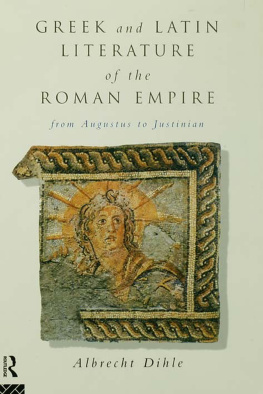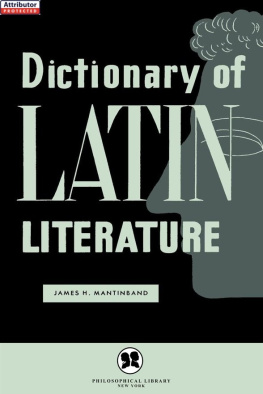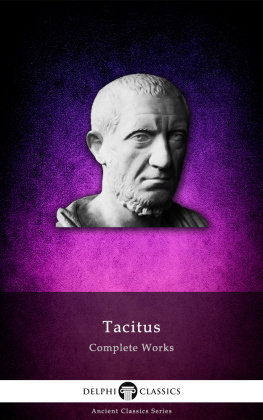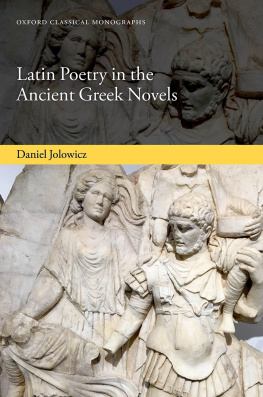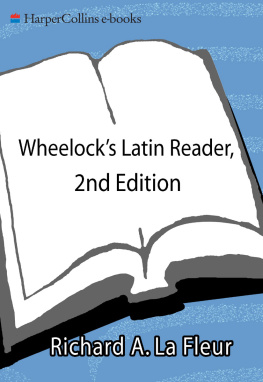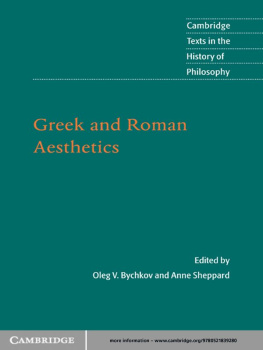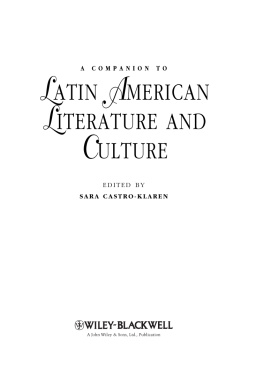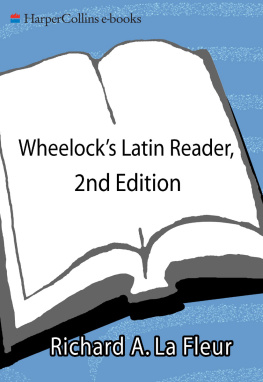GREEK and LATIN
LITERATURE
of the
ROMAN EMPIRE
This is the first book which describes Greek and Latin literature between the first century BC and the sixth century AD as a unity. This unity developed rapidly during the first century and disintegrated during the last century of that period.
Professor Dihle builds on Friedrich Schlegel's observation that art, customs and political life in classical antiquity are so entwined that they cannot easily be conceived of separately; he produces a history which encompasses all works of cultural and socio-historical significance. Besides poetry and prose, the book discusses letters and scholarly investigations, philosophy and rhetoric, historical writing and jurisprudence. The exact sciences, geography, medicine, mathematics, technology, and Jewish and Christian writings are also covered.
Individual treatment is given to major authors like Seneca, Tacitus, Plotinus and Augustine, as well as other writers who made significant contributions to their fields and have been unjustly neglected.
As the work of a single author, Greek and Latin Literature of the Roman Empire is a towering achievement an authoritative yet personal presentation of seven hundred years of cultural life. In this book, an unusually rich period of history receives for the first time a detailed but synoptic treatment: it is a book for students and scholars, as well as the general reader, which has no competitor.
First published 1989
by C. H. Beck'sche Verlagsbuchhandlung
This edition in English first published 1994
by Routledge
11 New Fetter Lane, London EC4P 4EE
Simultaneously published in the USA and Canada
by Routledge
29 West 35th Street, New York, NY 10001
C. H. Beck'sche Verlagsbuchhandlung (Oscar Beck),
Mnchen 1989
English translation Routledge 1994
Phototypeset in Garamond by
Intype, London
Printed and bound in Great Britain by
T. J. Press (Padstow) Ltd, Padstow, Cornwall
All rights reserved. No part of this book may be reprinted or reproduced or utilised in any form or by any electronic, mechanical, or other means, now known or hereafter invented, including photocopying and recording, or in any information storage or retrieval system, without permission in writing from the publishers.
British Library Cataloguing in Publication Data
A catalogue record for this book is available from the British
Library
Library of Congress Cataloging in Publication Data
Dihle, Albrecht.
[Griechische Literaturgeschichte. English]
History of Greek literature: from Homer to the Hellenistic
Period/Albrecht Dihle.
p. cm.
Includes bibliographical references and index.
1. Greek literatureHistory and criticism. I. Title.
PA3057.D513 1994
880.9dc20 93-45284
ISBN 0-415-06367-1
CONTENTS
PREFACE
This book is an attempt to realise a project announced in the preface to my history of Greek literature up to the reign of Augustus. The intention is to define the literary legacy of the Roman Empire's bilingual culture from its beginning to the last, brief restoration during the reign of Justinian as a coherent entity; to describe this entity and to explain it historically. If my attempt has been successful the result is a natural continuation, true to the course of historical events, of the literary histories of Rome and Greece, which may be described separately up to the Augustan era. But there should be no doubt as to the cultural unity of the period I have just outlined, in spite of all the changes which the countries around the Mediterranean Sea suffered in the long years between Augustus and Justinian.
What follows is the result of my efforts to deal with this task; it is not meant to serve as a work of reference, nor as a contribution to historical research. In view of the fragmentation and specialisation of Classical studies and the abundance of scholarly articles published every year, it seems that today information on individual issues can better be gained from encyclopaedic collections and from bibliographies than from historical accounts. In the latter the basic concept should remain recognisable as the essential feature, and not get snowed under by too much detail. Neither should the reader expect to find the latest results of specialised research presented and debated in a work which tries to put a unified historical perspective on a subject matter so wide-ranging and disparate that it comes under the domain of several academic disciplines.
Accordingly, my book is meant as an overview which should provide a motivation for studying some of the works discussed. The literary epoch I have dealt with contains relatively few writings which may be counted among the major products of world literature. Thus the reader should not be disturbed by the fact that my account does not focus exclusively on a small number of important works but discusses a large number of marginal texts also. The heritage of Classical literature from Hellas and Rome had to go through the filter of a Classicising educational tradition, beginningas early as the first century BC, a tradition which admitted only a tiny number of works of a very high quality. On the other hand a vast number of literary and subliterary texts gives us evidence of the upholders of this Classicising tradition during the Roman Empire, and especially of those Christian authors who adopted and adapted this tradition. It is the very diversity of the material which invites the attempt to define the relationship between the wide-ranging literary life which had blossomed through centuries and tenaciously preserved its inheritance and, on the other hand, the linguistic circumstances of the period in question, its intellectual life, and its social and political conditions. If the literature of the Empire was known to us only from a few works of exceptionally high quality, this task of historical interpretation would be much more difficult.
During the Imperial age, the area where Greek and Latin were spoken was, despite regional variations, a political and cultural unit. It was not until the third century AD that those tendencies could be felt which would lead to the formation of the individual cultural physiognomies of the Latin West and the Greek East, as they can be observed in the High Middle Ages. But even then, and much more so in the Late Classical age, there were far-reaching mutual influences. Those influences could hardly have had such lasting effects without that cultural unity of the entire region which was achieved in the High Empire. As the Latin Middle Ages cannot be understood without a perception of those elements in its intellectual life which it inherited directly or belatedly from the unbroken tradition of the Greek world, the culture of the Byzantine Empire and those eastern European states which succeeded it cannot be appreciated without reference to the living heritage of Rome.
The mutual interpenetration of Greek and Roman culture during the Empire, and especially during the period of Christianisation, made it possible for a Classical culture which had been moulded into a unit to remain intensely influential up to the present day. Both sources fed the flow of one tradition which kept their heritage alive. This is why, in the West as well as in the East, the Classical culture of both Rome and Greece could be rediscovered and revived repeatedly during the history of Europe; and why the Classical legacy could bear fruit under the most varied historical conditions in the Middle Ages and the Modern age. This should suffice to explain the importance of my attempt to illustrate the unity of Graeco-Roman culture during the Empire by a study of its literature.

